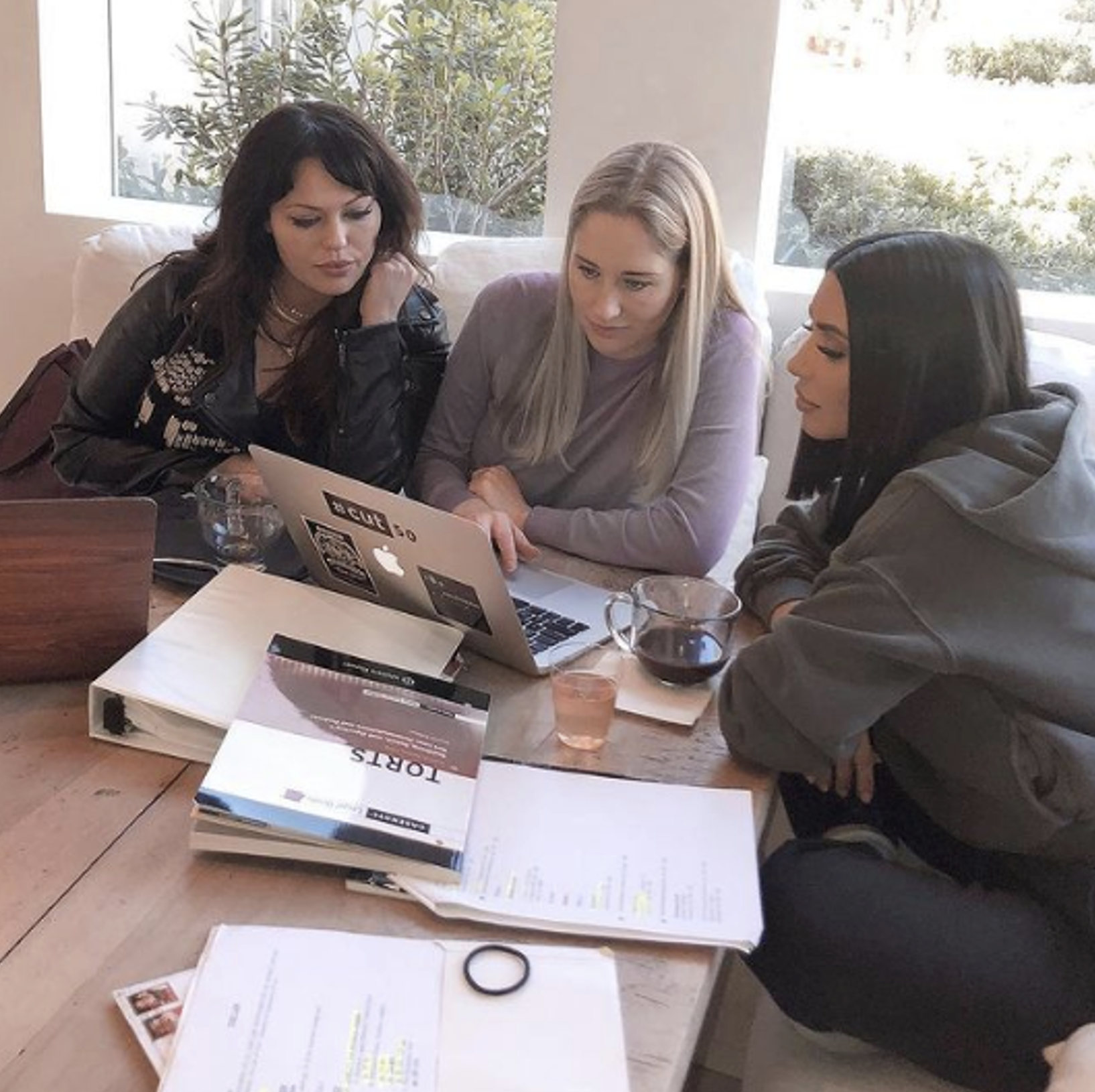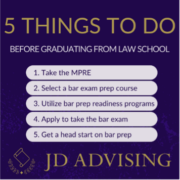How to Become a Lawyer Without Going to Law School
How to Become a Lawyer Without Going to Law School
Yes, you read that title correctly! Due to Kim Kardashian’s announcement at the end of 2021 that she passed the California Baby Bar Exam, many people want to know where they can follow a similar path to becoming a lawyer. Specifically, you may want to understand how to take the bar exam without going to law school. And we understand the intrigue! Law school can be a time-consuming and expensive experience. Who wouldn’t want to bypass that experience and still have their dream career? We discuss becoming a lawyer without going to law school in more detail below!
How to Become a Lawyer Without Going to Law School
This post will discuss:
- which states allow you to become a lawyer without going to law school,
- the requirements of potential lawyers who choose this path, and
- additional tips for people on this journey
This is certainly an unconventional way to become a lawyer, but it is definitely possible depending on your jurisdiction!
Where Can I Pass The Bar Exam Without Going To Law School?
Four states currently allow an aspiring attorney to take the bar exam without attending any law school:
- California,
- Virginia,
- Vermont, and
- Washington
Instead, the aspiring attorney participates in an apprenticeship with a licensed attorney or judge. Each state’s apprenticeship requirements are different and have varying lengths of study requirements. This practice is how the founding fathers became attorneys, and it is formally known as “reading the law.” To answer the ultimate question—yes, you can pass the bar exam and become a lawyer without going to law school in a handful of states! If this is something you’re interested in and want to learn more, keep reading!
California
Under Rule 4.29(A) of the state bar’s legal code, all candidates seeking to become attorneys must:
- Sit in a practicing attorney’s office or judge’s chambers for 18 hours per week for a period of four continuous years;
- Pass the First-Year Law Students’ Examination (also known as the “baby bar”);
- Have a positive moral character determination;
- Pass the Multi-state Professional Responsibility Examination; and
- Pass the California Bar Examination
Seems easy, right? No, not at all! While this is not the traditional approach to becoming an attorney, it still requires a lot of work and dedication! Also important to consider is the fact that there are specific requirements that the attorney or judge supervising the lawyer-to-be must satisfy under Rule 4.29(B), including being licensed in California, personally supervising the apprentice for 5 hours a week, examining the apprentice at least once a month for studies conducted, and sending the Committee of Bar Examiners of the State Bar of California detailed reports of the apprentice’s hours of study, materials used, and hours of supervision.
Thus, it is a lot of work on both the student and the supervising attorney’s part.

(Image Credit: Kim Kardashian’s Instagram )
Virginia
The Virginia Board of Bar Examiners has a similar program called the law readers program. To be admitted to the apprenticeship program, the applicant must have a bachelor’s degree.
The program requires the following of aspiring attorneys:
- Study for at least 25 hours per week in the supervising attorney’s office for 3 years, with at least 18 weekly hours studying directly with the supervising attorney;
- Have a positive moral character determination;
- Pass the Multistate Professional Responsibility Examination;
- Pass an exam at the end of each course of study; and
- Pass the Virginia Bar Examination.
The supervising attorney is required to personally supervise the aspiring attorney 3 hours per week.
Thus, while Virginia does not have a baby bar exam that aspiring attorneys in the apprenticeship program must take, the other requirements are similar to the state of California’s requirements.
Vermont
The Vermont Board of Bar Examiners program is called the Law Office Study Program, and aspiring attorneys must have “…a bachelor’s degree from an institution of higher education whose accreditor has been approved by the U.S. Department of Education.” (Vt. R. Bar Admin. 7(c)).
Vermont’s Law Office Study Program requires the following:
- The applicant must complete 4 years of supervised study under a licensed attorney or judge;
- Unlike Virginia’s more structured program requiring the aspiring attorney to pass examinations after each course, the Vermont program requires that the supervising lawyer or judge make reports of the apprentice’s work every six months;
- A determination that the applicant is of good moral character;
- The applicant must pass the Multistate Professional Responsibility Examination; and
- The applicant must pass the Vermont Bar Examination.
Washington
The Washington Board of Law Examiners has a program referred to as the Law Clerk Program, allowing aspiring attorneys to take the bar exam after 4 years of working with a lawyer, firm, or judge for the equivalent of full-time employment. Washington state requires that aspiring attorneys have an undergraduate degree in a field other than law. Specifically, under the state’s Admission and Practice rules:
- The aspiring attorney must study 120 hours a month for 12 months per year for 4 years;
- The aspiring attorney must complete monthly examinations administered by the supervising lawyer or judge. The supervising lawyer or judge will then submit the exam certification to the Board of Law Examiners;
- The aspiring attorney must be of good moral character;
- The aspiring attorney must pass the Multistate Professional Responsibility Examination; and
- The aspiring attorney must pass the Washington Bar Examination.
(Washington does not have a baby bar exam requirement.)
Is This Common? Who Chooses This Path?
This method of qualifying for the bar examination is relatively uncommon and is only offered in four states. However, the people who most commonly choose this path to sit for the bar exam have a variety of reasons for doing so. Many times, the people who choose the apprenticeship route seek to become attorneys as a second career and do not want to accumulate the debt associated with law school. The apprenticeship path is also more common for individuals who have many other commitments vying for their attention, such as children and other family obligations.
The most famous person to recently undergo one of these options is Kim Kardashian, who has been studying in the California program since 2019, attempting to follow in the footsteps of her father, Robert Kardashian. Robert Kardashian was a defense attorney in the 1995 O.J. Simpson murder trial. In December 2021, Kim K. announced that she had passed California’s Baby Bar Exam and could continue her journey to attempt to take the 2022 California Bar Exam.
The apprenticeship route, however, has its own challenges, depending upon which state’s program an aspiring attorney is working. In all scenarios, it is usually the case that the aspiring attorney needs to find the supervising lawyer or judge that they would like to work with and establish a relationship with that person. Choosing the right supervising lawyer or judge is crucial because you will be working with that person a lot! You want to make sure that they are a good fit for what you’d like the experience to be.
Beyond that, the nature of the apprentice route requires that the aspiring attorney is someone who can dedicate themselves to studying quite a lot, without the law school support of having a study group or classmates with whom you can commiserate or share outlines. This program requires a lot of personal discipline. However, it is something that can be accomplished, and it is no less difficult than going to law school!

What are the Pros and Cons of This Approach?
The apprenticeship route has its own pros and cons, as well. First, the pros!
- The most obvious pro is that the apprenticeship route is a much less expensive pathway to becoming a lawyer in the states it is offered. The only costs are books, study materials, registration fees, and bar fees, which typically total around $10,000 per program.
- Additionally, a key pro is that this program offers the ability to learn on the job, acquiring real lawyer skills as they study. Students choosing the traditional route often must take specific courses or participate in clinics to gain practical legal exposure and experience.
- A less obvious pro is that this route does not require taking the LSAT or applying to law schools, which can both be time-consuming and pricey processes!
- Plus, the most significant academic pro to the route is that you can learn at your own pace, as you are the only student!
- Finally, in terms of prospects, working with a supervising lawyer or judge allows you to make potentially useful connections with future clients, mentors, and collogues, in addition to the connection forged with the supervising attorney or judge.
Like any option, the apprenticeship route has its own downsides, too!
- The most obvious con is missing the law school experience, where many people form lifelong friendships with their classmates.
- Additionally, because the apprenticeship route offers no connection with a law school, you will not have the same access to the network, resources, and connections that a law school offers its students. More specifically, due to the lack of law school connections, aspiring attorneys choosing this route might not have access to Westlaw or LexisNexis during their period of study, even if they can gain limited access to law school libraries.
- Additionally, another con is related to the legal world often being associated with a certain amount of “prestige.” Qualifying to take the bar exam by means of the apprenticeship route could constrict the range of legal employment opportunities for aspiring attorneys. This is a double-edged sword, though—apprenticeship program attorneys likely have much more practical experience than law school graduates!
- The most significant con to this route is that aspiring attorneys who chose the apprenticeship route often pass the bar exam at a much lower rate than their Juris Doctor counterparts.
- Finally, aspiring attorneys who become barred in their state by way of the apprenticeship program cannot qualify in jurisdictions that do not have apprenticeship pathways, which can limit their geographic mobility.
However, whether to use the apprenticeship route to take the bar exam without going to law school is a deeply personal decision based on your life circumstances and your individual goals!
Recommendations For Your Journey
Take a Bar Prep Courses!
We recommend that aspiring attorneys looking to pass the bar exam without going to law school take a bar prep course! We understand that the path to being barred is not the same for everyone and is not linear. Whatever decision aspiring attorneys ultimately make, there is one constant—passing the Multistate Professional Responsibility Examination (“MPRE”) and the state bar examination. We realize that based on life circumstances and personal ambitions, some aspiring attorneys want to avoid the expense of law school. However, we urge you not to avoid the expense of a bar exam prep course, a Multistate Professional Responsibility Exam prep course, or even a tutor for the exams. Ultimately, the bar exam passage rate for aspiring attorneys using the apprenticeship route is about half of the passage rate of law school graduates. For example, in Virginia, from 2001 to 2019, the pass rate for aspiring attorneys using the apprenticeship route was 19%, compared with an overall pass rate of 68% for law school graduates.
We don’t tell you this to scare you, we promise! We tell you this so that you can fully prepare for the examinations and jump into your well-deserved legal career! You will work hard for 3 or 4 years to satisfy your state’s apprenticeship requirements, and you deserve to take your exams and pass them! Even law school graduates generally need to take a bar exam prep course. Many three-year law school programs do not cover all of the areas of law! Effectively studying for these required exams is too important for you to skimp on costs! J.D. Advising offers free resources for the bar exam and the MPRE, as well as tailored prep courses for both, and one-on-one tutoring (which has many advantages!). Combing your continued studies with tailored courses offer you the best opportunity to pass the bar exam without law school!
Read the Fine Print!
We recommend that aspiring attorneys looking to become licensed via an apprenticeship program become aware of the fine print. Fine print? Yes, unfortunately, there is some state-specific fine print associated with the apprenticeship route. For example, Vermont limits the number of times an aspiring lawyer can sit for the bar exam! The Board notes in the Rules of Admission to the Bar that “[a]pplicants may not sit for the examination more than four times.” (Vt. R. Bar Admin., Board Note, p. 17).
This can be accomplished by contacting the state’s Board of Admissions to the Bar and asking whether there is a limitation to how many attempts an applicant can make on the bar exam. If you already know who you want to serve as your supervising lawyer or judge, another option is to discuss the potential fine print with them. Additionally, we recommend that you discuss the apprenticeship program, fine print and all, with attorneys who also chose this path to be barred. They are likely to have a plethora of useful information!
J.D. Advising has worked with students using apprenticeship programs and has helped them to pass the bar exam and the MPRE. We know it is possible for you to pass the bar exam at the end of the apprenticeship route! Make sure to make the most of J.D. Advising’s resources, including our blog with lots of helpful hints and information. Regardless of the path you choose to become qualified to be barred, we wish you the best of luck!
Looking to Pass the Bar Exam?
Free Resources:
- 🌟Bar Exam Free Resource Center: Access our most popular free guides, webinars, and resources to set you on the path to success.
- Free Bar Exam Guides: Expert advice on the MBE, the MEE, passing strategies, and overcoming failure.
- Free Webinars: Get insight from top bar exam experts to ace your preparation.
Paid Resources:
- 🏆One-Sheets: Our most popular product! Master the Bar Exam with these five-star rated essentials.
- Bar Exam Outlines: Our comprehensive and condensed bar exam outlines present key information in an organized, easy-to-digest layout.
- Exclusive Mastery Classes: Dive deep into highly tested areas of the MBE, MEE, MPT, and CA bar exams in these live, one-time events.
- Specialized Private Tutoring: With years of experience under our belt, our experts provide personalized guidance to ensure you excel.
- Bar Exam Courses: On Demand and Premium options tailored to your needs.
- Bar Exam Crash Course + Mini Outlines: A great review of the topics you need to know!
🔥 NEW! Check out our Repeat Taker Bar Exam Course and our new premier Guarantee Pass Program!







Leave a Reply
Want to join the discussion?Feel free to contribute!